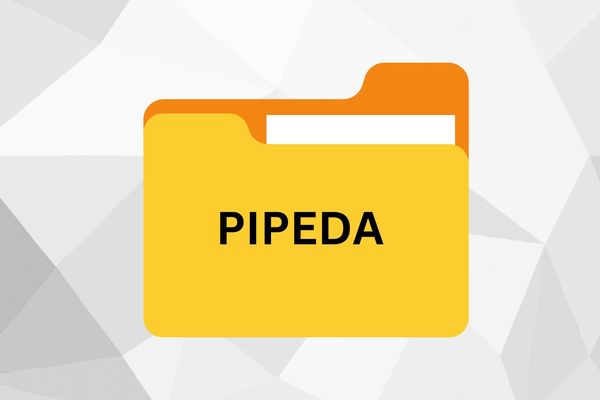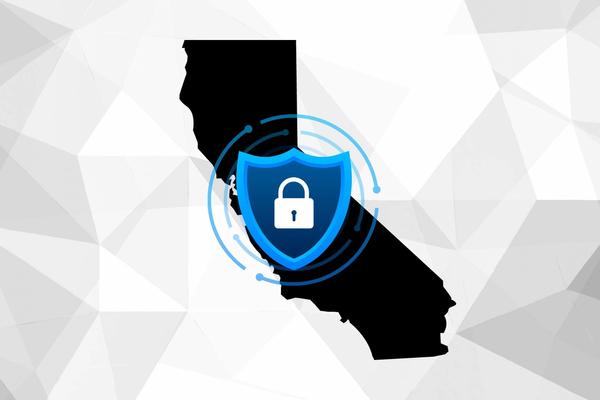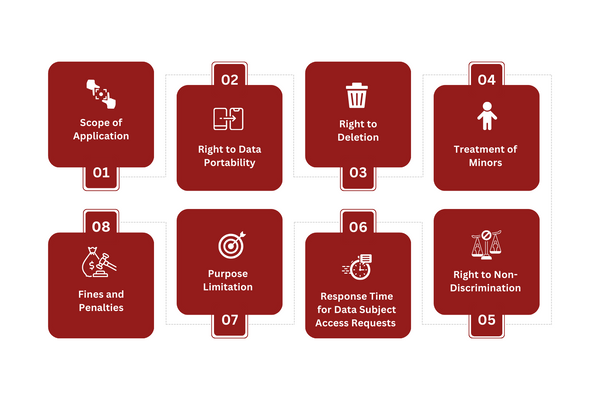
Understanding the differences between PIPEDA and CCPA is crucial for businesses. These laws, from Canada and California, set the standards for personal data protection.
As data privacy norms evolve, it’s essential for businesses to stay informed and compliant. In this article, we’ll look at an in-depth comparison of PIPEDA vs CCPA, focusing on consent, data collection practices, and compliance requirements to help businesses navigate these regulations effectively.
When comparing Canada’s PIPEDA (Personal Information Protection and Electronic Documents Act) with California’s CCPA (California Consumer Privacy Act), several key distinctions emerge. Here’s a breakdown of the top 6 major differences:
- Scope and Applicability:
- PIPEDA: Applies broadly to private-sector organizations across Canada that collect, use, or disclose personal information in the course of commercial activities. Some provinces have substantially similar legislation that supersedes PIPEDA within their borders.
- CCPA: Applies specifically to for-profit businesses that meet certain revenue or data processing thresholds and that collect personal information from California residents. This creates a more limited, but still broad, scope.
- Consumer Rights:
- PIPEDA: Focuses on principles of fair information practices, including access to personal information and challenging its accuracy. It has historically had weaker consumer rights compared to the CCPA.
- CCPA: Grants California consumers more extensive rights, including the right to know what personal information is collected, the right to delete personal information, and the right to opt-out of the “sale”8 or “sharing” of personal information.
- Right to Deletion:
- PIPEDA: Does not explicitly provide a general “right to be forgotten” or data deletion right in the same way as the CCPA.
- CCPA: Explicitly grants consumers the right to request the deletion of their personal information.
- Opt-Out of “Sale” or “Sharing”:
- PIPEDA: Does not have a direct equivalent to the CCPA’s “right to opt-out” of the sale or sharing of personal information.
- CCPA: Provides consumers with the right to opt-out of the sale or sharing of their personal information to third parties.
- Enforcement and Penalties:
- PIPEDA: Enforcement is primarily through the Office of the Privacy Commissioner of Canada, with potential for fines.
- CCPA: Is enforced by the California Attorney General and the California Privacy Protection Agency (CPPA), with the potential for significant financial penalties and a private right of action in certain circumstances.
- Consent:
- PIPEDA: Relies heavily on the concept of consent, which can be express or implied, depending on the sensitivity of the information.
- CCPA: While consent is still relevant, the CCPA places more emphasis on providing consumers with control over their personal information through rights such as opt-out and deletion.
It’s important to remember that privacy laws are constantly evolving. Therefore, staying up-to-date with the latest changes is crucial for businesses operating in both Canada and California.
Key Takeaways
PIPEDA and CCPA protect personal data but have different rules. Businesses dealing with Canadian or Californian data need to know these laws.
Clear consent and openness in data use are crucial in both PIPEDA and CCPA to build consumer trust.
Captain Compliance provides corporate compliance and outsourced compliance solutions to help businesses meet privacy regulations and maintain customer trust.
PIPEDA Explained

PIPEDA is Canada’s privacy law that came into effect in April 2000. It lays out the rules for how businesses must handle consumers’ personal information. PIPEDA makes sure that businesses don’t use consumers’ personal information in a way that could harm them.
It’s like a rulebook for businesses on how to handle personal information in Canada. PIPEDA sets out to protect this kind of information from being misused.
The digital world is full of personal information. PIPEDA was created to make sure businesses respect and protect this information. It allows people more control over their data and makes sure businesses are clear about what they’re doing with it.
Under PIPEDA, businesses must adhere to key rules, including DSAR requirements. This means if a consumer requests access to their data or requests a business to correct it, they must abide by the consumer’s request. Additionally, a business must obtain explicit consent for sensitive data.
PIPEDA applies to businesses that deal with Canadians – this includes most businesses in Canada and most online businesses collecting personal information. It doesn’t matter if you’re a big business or a small shop; if you’re dealing with personal information, PIPEDA is something you need to think about.
What is the CCPA?

California Consumer Privacy Act (CCPA) is a landmark privacy legislation in the United States that establishes benchmarks for data privacy and the rights of consumers. Initiated in January 2020, the CCPA, now CPRA, has significantly impacted both businesses and consumers in California.
The primary aim of the CCPA is to enhance Californians’ control over their personal information. California businesses must comply with the CCPA if they handle Californians’ data.
To meet the criteria, a business needs annual revenues of over $25 million. It should also have personal data from over 50,000 individuals. Or, it should make over half its income by selling consumer data.
This law is pertinent even to businesses not physically located in California, particularly if they have a substantial Californian consumer base or derive a significant part of their income from selling consumer data.
Under the CCPA, ‘personal information’ is defined broadly, encompassing clear identifiers like names and addresses, as well as less apparent data like internet browsing history and geolocation details. The law’s definition of ‘consumer’ is extensive, applying to data used for both employment and commercial reasons.
The CCPA grants several rights to consumers, just like the PIPEDA. CCPA requirements include the right to be informed about the collection, usage, and sharing of their personal information by businesses. Additionally, consumers have the right to request the deletion of their data held by businesses and to opt out of the sale of their personal information.
These new rules of CPRA started on January 1, 2023, giving people more rights, like fixing incorrect information and limiting how sensitive information is used.
PIPEDA vs CCPA Differences

Navigating the complexities of data privacy laws can be challenging for businesses, especially when comparing Canada’s PIPEDA and California’s CCPA. Both aim to protect personal information, but they have distinct approaches and requirements.
Let’s delve into a more detailed comparison.
Scope of Application
The CCPA is a law for big businesses in California and businesses outside of California, but it collects personal information from Californian citizens.
It’s for those making more than $25 million a year. It also includes businesses that deal with a lot of personal information from people in California – like if they collect, buy, or sell details from more than 50,000 people, households, or gadgets.
PIPEDA is different. It’s for all kinds of businesses that process data of Canadian residents, no matter how big or small they are. It applies to everyone doing business – small shops, big businesses, charities, and non-profits. If they’re doing business across provinces in Canada or even between countries, PIPEDA is important for them.
Right to Data Portability
CCPA empowers consumers with the right to receive their data in a usable format, facilitating the transfer of their data from one service provider to another. PIPEDA currently there is no equivalent right to data portability, limiting consumers’ ability to easily transfer their data between different service providers.
Right to Deletion
CCPA grants consumers the right to request the deletion of their personal information collected by businesses, subject to certain exceptions. PIPEDA doesn’t offer a direct equivalent to the CCPA’s right to deletion, often referred to as the “right to be forgotten.”
Treatment of Minors
CCPA prohibits the sale of personal information of individuals under 16 years of age without explicit consent. Children aged 13 to 16 can provide consent themselves, while for those under 13, parental consent is required.
PIPEDA requires parental consent for collecting, using, or disclosing personal information of children under the age of 13.
Right to Non-Discrimination
CCPA mandates that businesses must not discriminate against consumers who exercise their privacy rights. However, businesses can offer financial incentives related to collecting personal information. PIPEDA does not explicitly provide a non-discrimination right similar to the CCPA.
Response Time for Data Subject Access Requests (DSARs)
CCPA requires businesses to respond to consumer requests (DSARs) within 45 days, with a possible extension of an additional 45 to 90 days under certain circumstances. PIPEDA obligates businesses to respond to requests regarding personal information within 30 days.
Purpose Limitation
CCPA lacks a specific provision for purpose limitation, allowing more flexibility in how businesses use personal information. PIPEDA imposes strict purpose limitations, requiring businesses to identify the purposes for data collection at or before the time of collection and to limit the use of personal information to those identified purposes.
Fines and Penalties
CCPA fines are $2,500 per unintentional violation and up to $7,500 per intentional violation. Businesses are given 30 days to address violations before fines are levied.
PIPEDA can impose penalties of up to 100,000 Canadian Dollars per violation, depending on the severity of the violation.
PIPEDA vs CCPA Similarities
While PIPEDA and CCPA have their differences, they also share some key similarities. Both laws focus on protecting personal information and give people more control over their data.
Understanding these similarities is crucial for businesses to ensure they respect and protect customer information, whether they operate in Canada or California.
Consent Requirements
Both PIPEDA and CCPA emphasize the importance of consent, especially when dealing with sensitive personal information.
They require businesses to get permission from individuals before collecting, using, or sharing their personal information. This consent is mainly an opt-out model, where individuals have the right to say no to their data being used or sold.
Transparency
Transparency is of crucial importance to both PIPEDA and CCPA. They make sure businesses are clear about what they’re doing with personal information. This means businesses need to tell people what data they’re collecting, why they’re collecting it, and who they’re sharing it with.
Accountability
Accountability is key in both PIPEDA and CCPA. Businesses are responsible for the personal information they handle. They need to make sure they’re following the rules and protecting this information properly. If something goes wrong, like a data breach, they need to own up to it and take steps to fix it.
Data Minimization
Data minimization is another common point. Both laws say that businesses should only collect the information they need. They shouldn’t gather more data just because they can. The idea is to limit the amount of personal information businesses hold to reduce the risk of it being misused.
Both laws mandate the destruction of personal information when it is no longer necessary for the business to use.
Right to Know and Access
Both PIPEDA and CCPA uphold data subject rights, including the right for individuals to know what personal information a business holds about them. People can ask businesses to show them the data they’ve collected. This helps individuals understand what information is being used and ensures transparency from businesses.
Closing
Navigating the complexities of data protection under PIPEDA and CCPA can be challenging. But our compliance services are here to assist.
Captain Compliance is here to guide you through every step. Our compliance training programs are designed to aid your business in understanding consent requirements, ensuring data minimization, maintaining transparency, and aligning with key legal standards.
Remember, compliance is more than just following rules; it’s about earning your consumers’ trust. Let us help you in making your business a trusted name in data privacy. Ready to take the next step?
Get in touch with us at Captain Compliance, and let’s work together towards a secure and compliant future for your business.
FAQs
How Can I Understand CCPA Regulations More Clearly?
Understanding CCPA regulations can be challenging, but it’s crucial for businesses in California. These regulations cover consumer rights, data handling, and compliance requirements. For a clear and detailed explanation of CCPA regulations, check out our comprehensive guide at Captain Compliance.
Learn more about CCPA regulations and how they apply to your business here.
What are the Main Differences Between PIPEDA and CCPA?
The main differences lie in their scope and specific rules. CCPA mainly applies to larger businesses in California. Does who are focusing on consumer rights like data deletion and opt-out options for data selling? PIPEDA applies to all businesses that process the data of Canadian residents and emphasizes limited collection and use and data protection across all sectors.
Learn how PIPEDA differs from other privacy laws in this guide.
How Do Businesses Obtain Consent Under PIPEDA and CCPA?
Under both PIPEDA and CCPA, businesses must clearly ask for consent to collect, use, or share personal information. PIPEDA requires explicit consent in most cases. Meanwhile, CCPA operates on an opt-out basis, allowing consumers to refuse the sale of their personal data.
Confused about consent requirements? We have a comprehensive guide to help you out. Visit our website for more information!
What Are the Penalties for Non-Compliance with PIPEDA and CCPA?
Non-compliance with PIPEDA can lead to fines of up to 100,000 Canadian Dollars per violation. Under CCPA, fines can reach $2,500 for unintentional violations and $7,500 for intentional ones. Both laws emphasize the importance of following data protection rules. Between PIPEDA and GDPR Fines you could be paying out thousands of dollars a year if you do not fix up your website now.